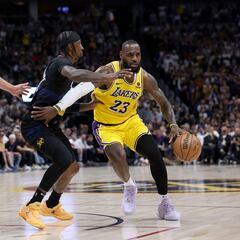Joel Embiid affected by a mild case of Bell’s Palsy: What is it and how does it affect him?
Philadelphia 76ers star center and reigning MVP Joel Embiid has reportedly been treated for Bell’s palsy, according to ESPN’s Adrian Wojnarowski.


Philadelphia 76ers star center Joel Embiid is being treated for a mild case of Bell’s palsy, according to Adrian Wojnarowski, citing ESPN sources.
The NBA insider reported on X that Embiid has been suffering from the condition since “the play-in victory over Miami, but he wanted to keep it private to avoid distractions for his team.” Despite his condition, Embiid has played each game of the playoffs.
READ ALSO: The Sixers, while against the ropes: “It is unacceptable”
ESPN Sources: Sixers star Joel Embiid has been treated for a mild case of Bell’s palsy for the past week. The condition began during the play-in victory over Miami but he has wanted to keep it private to avoid distractions for his team.
— Adrian Wojnarowski (@wojespn) April 26, 2024
READ ALSO: When is Joel Embiid back?
What is Bell’s Palsy and how does it affect Joel Embiid?
Bell’s Palsy is a condition that causes sudden, temporary weakness or paralysis of the muscles on one side of the face. It happens when the facial nerve, which controls the muscles responsible for facial expressions, becomes swollen or compressed.
According to NBA writer Tim Bontemps, Embiid thinks of his condition as annoying and unfortunate, but he continues to push anyway.
Joel Embiid said dealing with Bell’s Palsy has been “pretty annoying.” “It’s unfortunate … got to keep pushing.”
— Tim Bontemps (@TimBontemps) April 26, 2024
Symptoms of Bell’s Palsy can develop rapidly, typically within hours or days, and may include drooping of one side of the face, difficulty closing one eye, drooling, difficulty smiling or making facial expressions, altered sense of taste, and increased sensitivity to sound in one ear.
Related stories
The exact cause of Bell’s Palsy is not always clear, but it is believed to be linked to viral infections, particularly herpes simplex virus. Other factors such as autoimmune disorders, inflammation, and even stress may also contribute to the condition.
Bell’s Palsy can be distressing, especially due to its sudden onset and visible symptoms, but the condition usually resolves on its own within a few weeks to months for most people. According to Johns Hopkins Medicine, most people with the condition “recover full facial strength and expression.”


Complete your personal details to comment